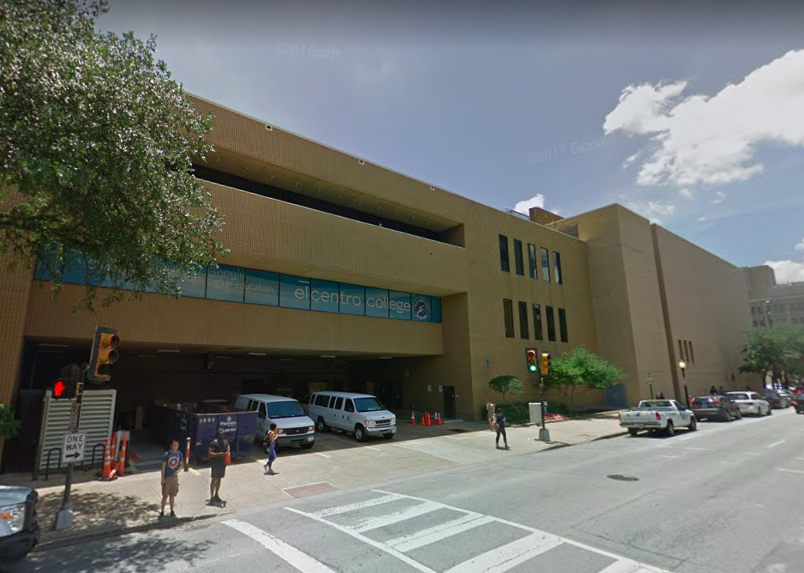For about a year and a half, the Dallas County Community College District has been promising free college for students at 31 area high schools, no questions asked. This week, we got a chance to see just how many students are taking them up on the offer and look at the program’s next stages, as the various stakeholders of the so-called Dallas County Promise released a study and piled into a downtown Dallas conference room to talk about it.
The high schools were selected because they’re considered most in need. Within the 25 Dallas ISD schools, 90 percent of the student population is economically disadvantaged. And in the year since instituting the Promise, DCCCD saw a 35 percent enrollment increase from students of those schools (UNT Dallas, which also offers the students free tuition, saw a 30 percent increase).
That’s good for about 2,500 current community college enrollees through the program. And retention among those students is 12 percent higher than among non-Promise students.
With the model proving itself, DCCCD says it will expand to 57 high schools next year. Couple that with the DISD rollout of P-TECH—which gives students a chance to pick an early pathway to a tech job that could result in a (tuition-free) Associate’s degree alongside their high school diploma—and you have a local college environment that’s becoming friendlier to the sort of low-income, disadvantaged students it often treats poorly.
The Dallas County Promise was instituted in fall 2017, modeled after a similar program in Tennessee. Metrics showed that six years after high school graduation, just 15 percent of DISD students had earned a post-secondary degree, Superintendent Michael Hinojosa said Tuesday. In two years, he hopes that as many as 20 percent of the district’s seniors could walk away from graduation having already reached that mark with an Associate’s degree.
“And then, what we learned from P-TECH in New York (where the program originated) is that persistence rates—once you get an Associate’s Degree—are off the charts,” he said. “It’s over 50 percent that go ahead and finish their Bachelor’s degree, because now they have credit and escrow. They have changed their belief system. They will get across that finish line, and it won’t take them six more years to get it done.”
The Promise is an effort by DCCCD and the Commit Partnership. A year ago, it got a boost from private industry in the form of a $3 million pledge from JPMorgan Chase. Among other things, that money has gone toward mentorship. It also funded the study out this week, in line with the one-year anniversary of the donation, titled “The Dallas County Talent Report.”
“The work that we’re all doing to impact thousands of kids will really propel Dallas’ economy,” said Anne Motsenbocker, managing director at JPMorgan Chase. “It’s creating a systemic change for our city, but it doesn’t happen without the jobs being at the end of that system or throughout that system.”
She called on others in the business community to get involved in helping shape student pathways toward the needs of the workforce.
The gap between employers’ needs and the abilities of the workforce continues to complicate an otherwise healthy job market. The study found that while 75 percent of Dallas County students don’t go on to earn a college degree, 65 percent of the county’s jobs require it. By the study’s estimation, that amounts to $18 billion in lost lifetime wages for each graduating cohort.
Part of the solution, too, is providing better resources for students who do enroll in college, as support services can make the difference in keeping a dropout-risk student around. To that end, DCCCD Chancellor Dr. Joe May said Tuesday that the district has been engaging with students to figure out ways to better serve their needs.
“It’s kind of obvious in a way,” he said. “If you’re on free and reduced lunch when you’re in high school, if you’re struggling with transportation in high school, simply going to college didn’t change all that. You’re still dealing with the same issues.” He said the DCCCD Foundation has shifted funds to allow for campus food pantries, including mobile delivery straight to students’ doors, as well as public transit passes. “That may not get you the first mile, but in many cases, like El Centro, it can get you the last mile.”
For May and DCCCD, Dallas County Promise has been successful in more ways than one. Added enrollment from the program, which projects to continue rising with more schools coming aboard, helped the district pass a $1.1 billion bond package this month, getting the OK from Dallas County voters without much objection. About half that money is slated for a new downtown El Centro College campus, including a “Dallas Education and Innovation Hub.” It will also go toward lifting facilities and programming for its growing base of enrollment.





